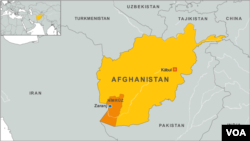Taliban fighters appear to be expanding their stranglehold on parts of Afghanistan, claiming to have seized control of their first province while also boasting about the assassination of a key Afghan government official.
Taliban spokesman Zabihullah Mujahid took to social media Friday, proclaiming victory over government forces in Afghanistan’s southwestern Nimruz province with the fall of the capital, Zaranj.
“The governor house, police HQ, intelligence HQ & all related buildings were cleared of stooge enemy presence,” Mujahid said, tweeting in English.
Pro-Taliban social media accounts showed pictures and videos of militants in front of government buildings, and reports by some local journalists suggested the city fell without a fight, though some Afghan government officials said that was not true.
“Forces from the National Directorate of Security fought the Taliban for an hour,” Haji Nabi Barahwe, the deputy provincial governor, told VOA, confirming that Zaranj had indeed fallen into Taliban hands.
“Afghan security forces are scattered,” Barahwe added, saying that forces guarding Zaranj had retreated to the Delaram district of Nimruz province and that at least three of the province’s five districts were under Taliban control.
There were also reports of looting in Zaranj, while video posted to social media claimed to show prisoners escaping from their jail cells.
In a second blow to the Afghan government, Taliban officials Friday claimed responsibility for the assassination of the head of the government’s Media and Information Center in a high-security zone in Kabul.
Dawa Khan Meenapal previously worked for Radio Free Europe/Radio Liberty's Afghan service, which like VOA, is part of the U.S. Agency for Global Media. Meenapal had once been kidnapped by the Taliban in 2008.
Taliban officials said he was killed as a result of “a special Mujahideen attack” and that he was being “punished for his actions.”
The assassination quickly drew condemnation from U.S. officials.
“We are saddened & disgusted by the Taliban’s targeted killing of Dawa Khan Meenapal, a friend and colleague, whose career was focused on providing truthful information to all Afghans about #Afghanistan," the acting U.S. ambassador, Ross Wilson, wrote on Twitter.
“These murders are an affront to Afghans’ human rights & freedom of speech,” he added.
White House press secretary Jen Psaki was also critical.
“If the Taliban claim to want international legitimacy, these actions are not going to get them the legitimacy they seek,” Psaki told reporters during a briefing.
“They do not have to stay on this trajectory,” she added. “They can choose to devote the same energy to the peace process as they are to their military campaign.”
There is little to suggest, however, that the Taliban are going to pull back on their current offensive.
Fierce fighting has raged for days in several key Afghan cities, with officials increasingly concerned that Kandahar, Herat and Lashkar Gah could all soon fall into Taliban hands.
A U.S. official, speaking on the condition of anonymity because of the sensitive nature of the information, told VOA on Friday that the U.S. has been carrying out airstrikes near all three cities, part of a focused effort to help Afghan forces repel constant Taliban attacks.
But there are concerns that U.S. airstrikes, which are now being launched from bases in Qatar and ships in the Arabian Gulf, will not be enough to help Afghan forces withstand a Taliban offensive that seems to be able to find and exploit weaknesses in the government’s defenses.
“This is not a surprise,” an international counterterrorism official, speaking on the condition of anonymity, told VOA.
“The Taliban exploited their freedom of movement to prepare for this,” the official added, saying it was “appalling” that Taliban commanders were allowed to use talks with the U.S. and with the Afghan government to preposition their forces for the current offensive.
The official further warned that ongoing calls for the Taliban to negotiate will likely play out in the same way.
“The Taliban have become very good at sort of cosmetic action and keeping up appearances,” the official said. “They certainly don’t want to shut down negotiations.”
For their part, Afghan government officials are promising the Taliban gains will not last long.
On Friday, Fawad Aman, a defense ministry official, tweeted government forces had retaken Sherbeghan, the capital of Jowzjan province, which had briefly come under Taliban control.
“#ANDSF and Public Uprising Forces inflicted heavy casualties to #Taliban and the death bodies remained on the streets and alleys of the city,” Aman said.
“Taliban will be defeated in #Nimruz as well,” he added.
Afghan President Ashraf Ghani said this past Monday that his government had a “clear plan” to counter the Taliban’s military gains, assuring Afghan lawmakers that security forces would restore stability within six months.
Ghani did not share specifics.
Some U.S. intelligence estimates have warned that the government in Kabul could fall quickly once the U.S. withdrawal from Afghanistan is completed later this month.
A report from the U.S. Special Inspector General for Afghanistan Reconstruction, issued last week, warned the Afghan government is facing an “existential crisis.”
“The ANDSF [Afghan National Defense and Security Forces] has retaken some districts,” the report said. But from public reporting, the ANDSF appeared surprised and unready, and is now on its back foot.”
Patsy Widakuswara, Ayaz Gul, VOA’s Afghan Service contributed to this report.






